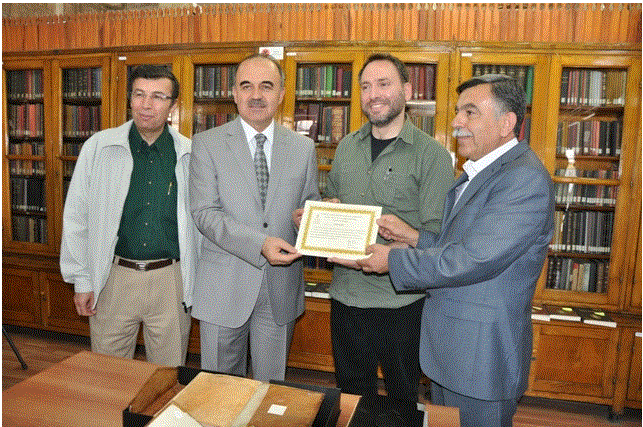In The News: Tons of Old Books Thrown Away; Two Stolen Manuscripts Recovered
- by Michael Stillman

Hüseyin Sen receives his award (from Konya government website).
Libraries lose books, sometimes through theft, sometimes through carelessness, never for a good reason. A library in Thailand lost tons of books, quite literally, for the worst reason we've come across in a long time. The victim of this loss was Silpakorn University in Bangkok, and lest you think this is some obscure, mediocre school, it serves 28,000 students and holds the reputation as the top fine arts school in the country.
Their library is in the process of undergoing a significant renovation. It required temporarily removing many of their old books. Meanwhile, the library needed to dispose of some more recent books and magazines of little value. You can probably see where this is going. The library called up a local junk shop that advertised for waste paper to recycle. The librarians made a deal. They agreed to sell 3 tons of unwanted books to the junk dealer for 600 baht. That's not a lot of money. It translates to $175 in U. S. currency.
A few days later, the junk shop owner and four men arrived at the library with their truck. Most of the librarians were on lunch break at the time, but one official who was there pointed to a pile of books. They filled up the truck and took them back to the shop. Evidently, no one at the library noticed, at least not for several days.
Meanwhile, some of the university lecturers and collectors discovered the old books at the junk shop. They reportedly were incensed to think the university was selling its old books to such a place. Fortunately, they bought most of them up, though at five times the price the junk dealer paid for them. Not so fortunately, a few hundred pounds of the books had become soaked in a rain storm and had already been recycled. Arrangements are being made to sell the books back to the library, presumably for what the lecturers and collectors paid as their aim is to see them back where they belong.
The librarian responsible for making the sale turned in a letter of resignation but the university declined to accept it. The head of the library explained that this wouldn't solve anything and he wanted the librarians to all work together to prevent such problems from reoccurring. He asked people to sympathize with the librarians "because they also love these books." As for the junk dealer, he had a better excuse for not realizing the books were valuable and should not be recycled. "I didn't know they were rare books," he was quoted as saying. "I left school when I was in fourth grade."
A pair of very old manuscripts, stolen from a library in Turkey in 2000, were discovered at the University of Pennsylvania library and returned to their rightful owner. This positive conclusion came about through some thorough sleuthing by a student at the University of Utrecht in the Netherlands. This was one enormously lucky break for the Turkish library, which just serves to show how difficult tracking down stolen material can be. Another roughly 100 manuscripts stolen at that time are still missing.
In 2000, 103 manuscripts, 7 books, and 62 covers from other books were stolen from the Yusuf Aga Manuscript Library in the Central Turkish province of Konya. The reason the old covers were stolen is evidenced by this find. The thieves not only attempted to remove identifying markers from the manuscripts, they used the old covers to fashion new (yet old) covers for the manuscripts to better disguise them. These manuscripts were very old, dating back to the 13th century.
The two returned manuscripts were purchased by American collector Lawrence Schoenberg. Lawrence was a son of the noted composer and artist Arnold Schoenberg. He also was a graduate of the University of Pennsylvania and a member of their Library Board of Overseers. Lawrence died last year. He gave his collection to the University of Pennsylvania.
Meanwhile, at the University of Utrecht, Hüseyin Sen was studying for his Ph. D. Sen is from Turkey and has a deep interest in old Turkish manuscripts. Medieval Arabic manuscripts are part of his studies at UU (if that's what they call the university). He was researching bird houses, which might seem like an obscure topic, but they were commonly found in mosques. In the back of his mind, he was aware of the earlier theft from the Konya library. When he came across a couple of old manuscripts contained in the Schoenberg collection at the University of Pennsylvania, they sounded familiar. He dug in deeper. He began comparing various points and reached the conclusion these must be among the manuscripts stolen from the Turkish library.
Sen knows Sare Davutoglu, wife of Prime Minister Ahmet Davutoglu. He sent her an email, which she forwarded to the Director of the Konya library. The identification was confirmed, and the manuscripts were returned by the University of Pennsylvania Library to their owner. Sen was rewarded with a plaque and thanks by the Konya Governor at a celebration in his honor.
Of course, this still leaves another hundred manuscripts missing, and if it takes a perfect storm of coincidences like this to find just two, it will be a long time coming before the rest are retrieved. The international nature of these thefts, and the obscurity of the items and their origin, gives a glimpse at just how difficult it is to stop the trafficking of stolen books and paper. Still, it must be done.